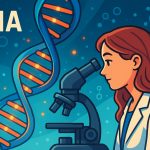Fresh cow’s milk has long been associated with health, strength, and nutrition, offering valuable sources of calcium, protein, and vitamins. However, despite its popularity, cow’s milk is not suitable for everyone. For some individuals, drinking it can lead to digestive discomfort, allergic reactions, or other health complications. Understanding who should avoid or limit cow’s milk helps ensure that dietary choices support well-being rather than harm it. The key lies in recognizing how our bodies process milk and what medical experts recommend for those with specific sensitivities.
Lactose Intolerance – The Most Common Reason
One of the most widespread reasons people cannot tolerate cow’s milk is lactose intolerance, a condition in which the body lacks enough lactase, the enzyme responsible for breaking down lactose, the natural sugar found in milk. When lactose is not properly digested, it ferments in the gut, leading to bloating, gas, cramps, and diarrhea. Lactose intolerance affects an estimated 65% of the global population, particularly among adults of Asian, African, and Indigenous descent. Nutritionists often recommend lactose-free alternatives such as almond, oat, or lactose-free cow’s milk for those affected.
Milk Allergy – A True Immune Reaction
Unlike lactose intolerance, a milk allergy involves the immune system rather than digestion. It occurs when the body mistakenly identifies milk proteins—especially casein and whey—as harmful invaders. Symptoms can range from mild (rashes, hives, nasal congestion) to severe (anaphylaxis). This condition is most common in infants and young children, though some carry it into adulthood. Pediatric allergists emphasize that milk-allergic individuals must completely avoid all dairy products, as even trace amounts can trigger reactions. In such cases, fortified non-dairy alternatives are essential for maintaining adequate calcium and vitamin D intake.
Individuals with Digestive Disorders
People with certain digestive diseases, such as irritable bowel syndrome (IBS), Crohn’s disease, or ulcerative colitis, may experience worsened symptoms after consuming cow’s milk. The combination of fats, proteins, and lactose can irritate sensitive intestinal linings, leading to inflammation or discomfort. Gastroenterologists often advise these patients to eliminate or reduce dairy during flare-ups. For some, fermented dairy products like yogurt or kefir, which contain probiotics and lower lactose levels, may be better tolerated—but this varies widely among individuals.
Hormonal and Acne Concerns
Some dermatologists and endocrinologists suggest that cow’s milk, particularly non-organic varieties, may influence hormone balance and skin health. Milk naturally contains growth hormones and insulin-like growth factor 1 (IGF-1), which can increase oil production in the skin and potentially contribute to acne in sensitive individuals. Teenagers and adults prone to hormonal acne sometimes report clearer skin after reducing dairy intake. However, experts caution that evidence remains mixed, and not everyone experiences such effects.
People with Dairy-Related Inflammatory Sensitivity
In some adults, even without clear intolerance or allergy, cow’s milk may trigger low-grade inflammation, leading to joint pain, fatigue, or digestive changes. This reaction is often related to individual differences in the gut microbiome or immune response. Nutritionists recommend paying attention to how the body reacts after dairy consumption and consulting specialists for personalized advice rather than relying on general assumptions.
Infants and Early Childhood Considerations
Infants under 12 months should not be given fresh cow’s milk as a main drink. Pediatric experts warn that it lacks essential fatty acids and certain nutrients necessary for early brain and organ development. Moreover, early exposure can increase the risk of developing allergies. Infant formulas or breast milk remain the safest sources of nutrition during the first year of life. Afterward, gradual introduction under medical supervision can help determine whether a child tolerates dairy.
Ethical and Expert Perspectives
While some view cow’s milk as an essential part of traditional diets, others advocate for reduced consumption due to health, environmental, or ethical reasons. Dr. Walter Willett of Harvard T.H. Chan School of Public Health argues that moderate milk intake is safe for most adults but not essential, suggesting that nutrients like calcium and protein can be obtained from vegetables, nuts, and legumes. On the other hand, dairy industry experts highlight the high bioavailability of milk nutrients, emphasizing its value for bone health when well-tolerated. The consensus: milk can be beneficial for many but problematic for some—individual biology matters most.
Interesting Facts
- Approximately 70% of adults worldwide lose the ability to digest lactose effectively after childhood.
- Cow’s milk allergy affects about 2–3% of children globally.
- Fermented dairy products like kefir and yogurt contain beneficial bacteria that aid digestion.
- Some populations, like Northern Europeans, developed genetic mutations allowing lifelong lactose tolerance.
- Goat and sheep milk, though different in composition, can also cause allergic reactions in people sensitive to cow’s milk proteins.
Glossary
- Lactose – A natural sugar found in milk, composed of glucose and galactose.
- Lactase – The enzyme responsible for breaking down lactose during digestion.
- Casein – The main protein in milk that can trigger allergic reactions.
- Whey – The liquid protein component of milk separated during cheese production.
- Anaphylaxis – A severe, potentially life-threatening allergic reaction.
- Probiotics – Beneficial microorganisms that support gut health.
- Inflammation – The body’s immune response to irritation or injury, sometimes triggered by food sensitivities.
- IGF-1 (Insulin-like Growth Factor 1) – A hormone in milk that can affect skin and metabolism.
- Bioavailability – The degree to which nutrients can be absorbed and used by the body.
- Microbiome – The collection of microorganisms living in the human digestive system that influence health.


